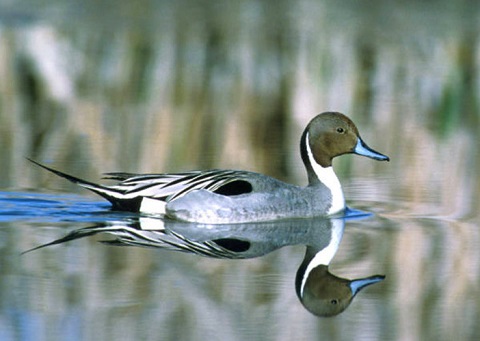
Report Date:
http://californiaoutdoorsqas.comQuestion: When hunting waterfowl in California, how do hybrid ducks and geese count toward species limits? For example, the first duck of the day someone shoots looks like a cross between a pintail and a mallard. Would that hunter be within his/her limit to shoot another two pintail? Another example would be if a hunter was within the Special White Fronted Goose Zone and shot a goose with both Canada goose and White Front features. I’ve heard other hunters claim everything from you can consider it the more restricted species, to it’s an “other” duck on a refuge kill card/entry permit, to it’s the species with fewer restrictions. (Andy D.)
Answer: The bird will count towards your daily bag limit, and if it looks like a pintail, it will count towards your pintail limit. Always consider the most conservative approach to your limit even if you think you might have a hybrid. Your best bet would be to consider it the more restricted species.
Halibut fishing out of Tomales Bay during a groundfish closure?
Question: I want to fish for California halibut from a boat out of Tomales Bay near Bird Rock or Elephant Rock or go out of the Gate. I used to fish for them whenever herring, squid or anchovy would come in to spawn during the winter or spring. The halibut would lay in wait as the forage fish came through, usually from January through April or May.
I haven’t done this kind of fishing for a long time (years in fact) because no one wants to go out there in the wintertime when no one else is fishing and we are absolutely alone at sea. My fishing buddy wants to go but is worried that we would be cited for targeting lingcod or rockfish. I told him that as long as we were not keeping anything except the halibut, we would not be cited. We wouldn’t be doing anything wrong. But he repeated that he was worried that we would have no protection against being cited because we were out there during the closed groundfish season.
Can we be cited for targeting groundfish as long we do not keep any incidentally caught groundfish? Or, how about steelhead or Pacific halibut or canary cod or anything else that you are not allowed to keep? (Jerry Z.)
Answer: Warmer ocean water temperatures have made some interesting adjustments to the ocean and fish distribution in recent years. During the summer months when the water warms, more halibut move into Tomales Bay. You know that the sandy bottoms are where the halibut hang out. You indicated fishing the Bird and Elephant Rock areas, so keep in mind there are a lot of underwater rock croppings there. That’s where the rockfish and lingcod hang out.
According to local California Department of Fish and Wildlife (CDFW) Lt. Jim Jones, incidental catch is not a violation. However, once you do catch a species that is prohibited, it’s recommended that you leave that area. If you continue to fish and catch fish you are not targeting, you could be cited.
If you are fishing during a closure (such as now) and start catching lingcod and rockfish, even if you are fishing catch and release, you could receive a citation for targeting those fish, depending on the situation.
Van Duzen River pikeminnow fishing regs?
Question: After a short 35-year hiatus, I have decided to return to sport fishing. I live within walking distance of the Van Duzen River and my friends tell me it is “infested” with pikeminnow, a non-native and destructive predator of salmonid eggs in this watershed. I have tried to read the regulations online but am confused as to the restrictions on this fish in my area. (Tony W.)
Answer: Welcome back! Sacramento pike are a California native species, and although they are natural predators of salmonids, they have coexisted in streams for many years.
For regulations on the Sacramento pikeminnow, please check section “5.95. OTHER SPECIES” on page 27 of the 2016-2017 Freshwater Sport Fishing Regulations handbook. Here it states that other species of fish not included in the species-specific regulations may be taken “in any number and at any time of the year by angling,” except for in the closures and restrictions listed under district special regulations. Specific regulations for the Van Duzen River can be found on page 42 of this regulations booklet (California Code of Regulations Title 14, section 7.50(b)(63)(B)). Sacramento pikeminnow (Ptychocheilus grandis) are also referred to by some as Sacramento squawfish.
Selling skulls?
Question: Is it legal to sell skulls and bones from small mammals such as fox, skunk, raccoon, opossum, coyote, badger and bobcats? (Kayla M.)
Answer: No, it is “unlawful to sell or purchase a bird or mammal found in the wild in California” (Fish and Game Code, section 3039). However, “products or handicraft items made from furbearing mammals and nongame mammals lawfully taken under the authority of a trapping license may be purchased or sold at any time.”
Carrie Wilson is a marine environmental scientist with the California Department of Fish and Wildlife. While she cannot personally answer everyone’s questions, she will select a few to answer each week in this column. Please contact her at CalOutdoors@wildlife.ca.gov.
Report Date:
Question: We have a small orange grove in Ventura County that has been overrun by ground squirrels in the past......